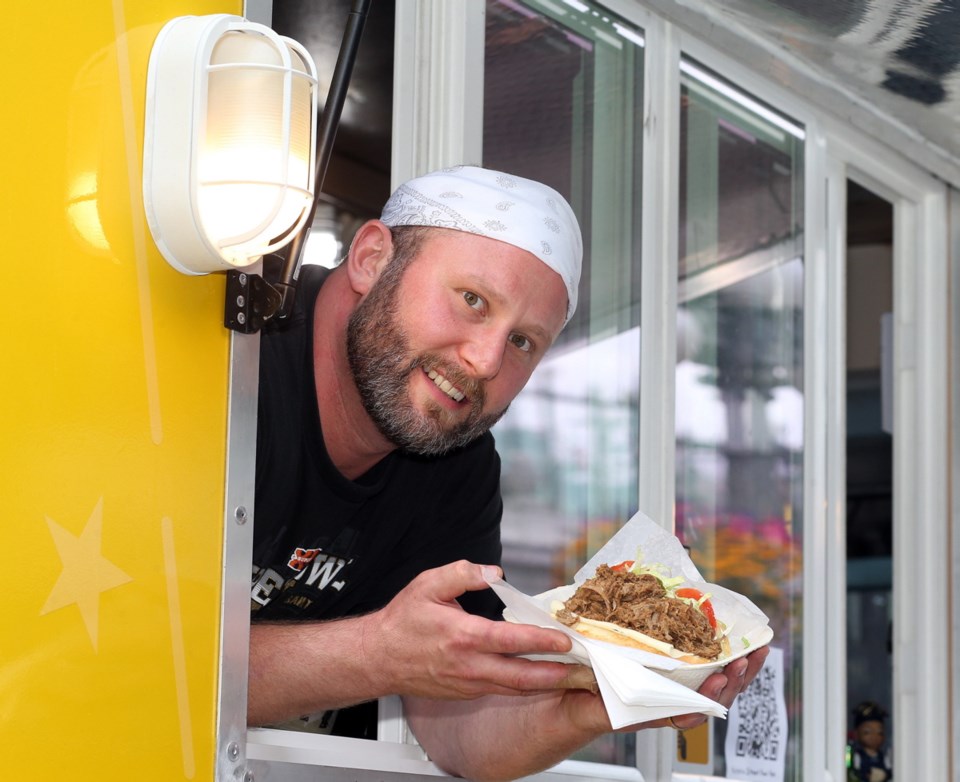Metro Vancouver and Victoria now have more than 300 food trucks, but the trendy mobile restaurants are struggling and, contrary to popular belief, are not a “golden ticket” to success, according to a Vancity report.
An average profit for B.C. mobile food service businesses is only $31,300 per year, and the turnover rate is nearly 80 per cent, according to the financial institution. Twenty-nine per cent are not profitable, the report said.
Karrie Hill, owner of Victoria’s Deadbeetz truck, is in her third year and is happy with her choice of business. “I turn a profit,” she said. “It gets better each year. You’ve got to be in it for the long haul.”
She cautions that, like any small business, hours are long. Deadbeetz is now located on Royal B.C. Museum property, part of a cluster of food trucks established this year which have become a destination for locals and visitors. Hill is thrilled to be in that location, especially after moving from place to place previously.
Municipal rules can make it challenging to find a location, she said Tuesday. “The first two years were kind of a struggle.”
Ingredients for success are hard work, experience, a good product, Hill said. Some people think this is an easy way to make money, but she cautions that margins are slim.
Sarah and Bill Rieger’s A Streetcar Named New Orleans food truck is also at the museum, giving customers a regular location.
“We have really enjoyed being in one place. I think a lot of good trucks will have more success staying in one spot,” Sarah said.
“You are making an OK living and hopefully you can support your family. But if you are wanting to be wealthy, you’re not going to do it off one food truck.”
She also agrees that experience is key. Bill worked at high-end restaurants in New Orleans before they opened the truck in Victoria.
Trucks often go to festivals, but face an uncertain outcome. There’s a huge amount of preparation and if there aren’t enough customers, food can go to waste,.
In some cases, Vancouver’s food truck costs can be higher than running a restaurant, according to Vancity’s report “Keep on Food Trucking,” compiled in May and June.
The report calls on local governments to ease regulations for the food trucks, which are threatened by high operating expenses, no alcohol sales, excessive permit and liability fees, long hours and operating as a weather-dependent business.
Ryan Spong, co-owner of Tacofino, a popular food truck that began in Tofino in 2009 and came to Vancouver in 2011, said he has seen many vendors come and go, but was surprised to hear the turnover rate was so high.
He agreed with the report in that one of the key barriers for vendors to succeed is the high cost of kitchen commissary space. Unlike some jurisdictions, like Los Angeles, where vendors can prepare food in their trucks, Vancouver requires all preparation to be done in a kitchen.
While commissary kitchen space is required, it is in short supply and can be costly, says Vancity, which is calling on cities to review the need for a central kitchen space for food truck operators.
Spong said commissary space can cost up to $2,500 a month and he thinks a kitchen space provided by the city would give young cooks the opportunity they need to survive in the beginning, though he says any subsidized vendors would need to be vetted for food quality and environmental practices.
“The bottom line though is you have to get the food right. I think good food resonates with people and once you get that right, the other challenges become a little easier,” said Spong. “We stand for something. We focus on fresh ingredients prepared daily and we focus on sustainable practices and I think people appreciate that.” Tacofino now has a couple restaurants in Vancouver, and the owners use the one in East Vancouver as their commissary space.
While that has made business smoother, Spong says it was a struggle when they were starting out to find space. They moved from the Portland Hotel Society’s kitchen to Save on Meats.
Tacofino also has a Fort Street location in downtown Victoria.
Among the report’s recommendations for municipalities are reassessing proximity rules to restaurants, extending mobile business licensing to mobile food vendors and being realistic about locations.
The report says municipalities should consider whether traffic volume is high enough through the week when handing out a stationary location and if it’s not, help the vendor find a new location.
Cities should also review the competitive threat to nearby restaurants and consider amending proximity rules, the report says.
“For the operators spoken to in this research, the reality of a food truck could hardly be further from the golden ticket many believe it to be. Local organic ingredients are expensive, margins are thin, bottom-line boosting alcohol sales are not allowed and there are few economies of scale,” the report says.
Motor vehicle insurance, permit fees, propane gas, parking meters which can run $500 a month in Vancouver, and licence applications all contribute to skyrocketing costs. Preparation and travel time for a three-hour selling window is also problematic because lunchtime sales are not enough to make a living, the report says.
The report concludes that although 44 per cent of Metro Vancouver and Victoria residents have eaten at a food truck in the last year, according to a Vancity poll, the industry is struggling and has nearly reached an estimated 80 per cent turnover of vendors, mostly due to the cost of commissary kitchens and insufficient demand at fixed locations.
Vancity conducted the poll of 300 people from Vancouver and Victoria from June 16 to June 18 using Google Consumer Surveys.
There are an estimated 305 food trucks in Metro Vancouver and Victoria, with annual revenue of roughly $50 million.



